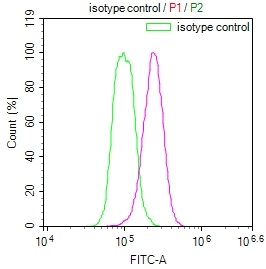RCBTB2 Antibody, FITC conjugated
-
中文名称:RCBTB2兔多克隆抗体, FITC偶联
-
货号:CSB-PA019504LC01HU
-
规格:¥880
-
其他:
产品详情
-
产品名称:Rabbit anti-Homo sapiens (Human) RCBTB2 Polyclonal antibody
-
Uniprot No.:
-
基因名:RCBTB2
-
别名:CHC1 L antibody; CHC1L antibody; Chromosome condensation 1 like antibody; RCBT2 antibody; RCBT2_HUMAN antibody; Rcbtb2 antibody; RCC1 and BTB domain containing protein 2 antibody; RCC1 and BTB domain-containing protein 2 antibody; RCC1 like G exchanging factor antibody; RCC1 like G exchanging factor RLG antibody; Regulator of chromosome condensation (RCC1) and BTB (POZ) domain containing protein 2 antibody; Regulator of chromosome condensation (RCC1) and BTB domain containing protein 2 antibody; Regulator of chromosome condensation and BTB domain containing protein 2 antibody; RLG antibody
-
宿主:Rabbit
-
反应种属:Human
-
免疫原:Recombinant Human RCC1 and BTB domain-containing protein 2 protein (1-200AA)
-
免疫原种属:Homo sapiens (Human)
-
标记方式:FITC
-
克隆类型:Polyclonal
-
抗体亚型:IgG
-
纯化方式:>95%, Protein G purified
-
浓度:It differs from different batches. Please contact us to confirm it.
-
保存缓冲液:Preservative: 0.03% Proclin 300
Constituents: 50% Glycerol, 0.01M PBS, PH 7.4 -
产品提供形式:Liquid
-
储存条件:Upon receipt, store at -20°C or -80°C. Avoid repeated freeze.
-
货期:Basically, we can dispatch the products out in 1-3 working days after receiving your orders. Delivery time maybe differs from different purchasing way or location, please kindly consult your local distributors for specific delivery time.
-
用途:For Research Use Only. Not for use in diagnostic or therapeutic procedures.
相关产品
靶点详情
-
基因功能参考文献:
- decreased expression in prostate cancer associated with the difference in frequency of variant isoforms between normal and neoplastic prostate tissues places it in a pivotal role or possibly adjacent to a gene with that role in prostate cancer evolution PMID: 12115502
-
亚细胞定位:Cytoplasmic vesicle, secretory vesicle, acrosome.
-
数据库链接:
Most popular with customers
-
-
YWHAB Recombinant Monoclonal Antibody
Applications: ELISA, WB, IHC, IF, FC
Species Reactivity: Human, Mouse, Rat
-
-
-
-
-
-



















